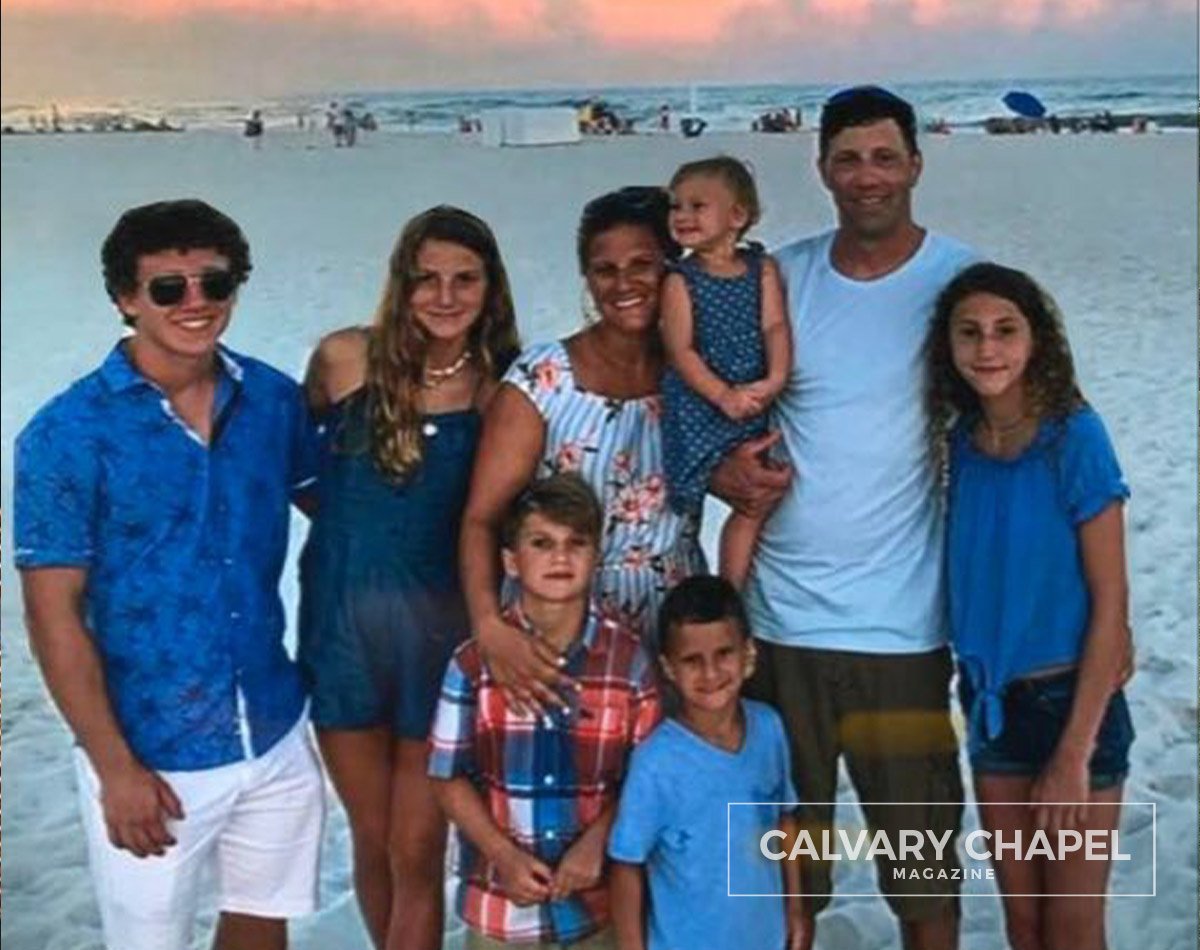Loss of a Child Part 4
Loss of a Child Part 4—Helpful or Hurtful? How to Respond When a Loved One Suffers Infant Loss—Calvary Chapel Shreveport, LA
Story by Carmel Flippen
Photos courtesy of Julianna Grace Ministry
This is Part 4 of a series on Julianna Grace Ministry. In this installment, founder Lisa Rowell and other women share how to minister to parents who have experienced the death of a baby.
Follow the series… Part 1: Beauty from Ashes; Part 2: Rainbows After the Storm; Part 3: Reaching Out Through the Pain; Part 5: God’s Faithfulness in Suffering
Lisa Rowell will never forget how, six weeks after her baby’s stillbirth, a well-meaning friend walked into her house laughing and asked, “Are you pregnant yet?” The friend may have felt her cheerfulness could “fix” Lisa's grief, or that by pointing Lisa forward she could force Lisa to move on. However, “To me it felt like she didn't understand how much I loved Julianna,” Lisa explained. “When people respond to a miscarriage or stillbirth by saying something like, 'Just have another baby,' it implies that the first baby didn't matter, and the next one will replace it.”
Rejoice with those who rejoice, and weep with those who weep. Romans 12:15
Losing an infant is not only heartbreaking, it can also be very isolating. Some well-meaning loved ones say hurtful things; others are afraid to speak about the loss at all. Yet it's at this difficult time that hurting families need their support systems the most. Here are some helpful suggestions from mothers who have experienced these situations first-hand.

Left: Matt and Desere Fosse with their six children. After experiencing the death of an infant, Desere, a teacher, appreciated the help her co-workers offered by dividing her job responsibilities.
What Hurts
Don't say, God has a plan or There's a reason for everything.
While these things are ultimately true, general spiritual platitudes are little comfort in such personal pain. “Part of Julianna's [death’s] purpose was so we could [start] Julianna Grace Ministry, but that comment was still not helpful in those early days,” said Lisa. Pray instead that God would give the hurting family glimpses of how He is working through this for their good.
Avoid At Least statements:
At least you don't have to deal with the morning sickness.
At least now you don't have to be up at 4 a.m. feeding your child.
At least you can have another child.
At least your baby is in a better place.
“Even though that's true,” Lisa related, “I wanted Julianna here with me.” Parents who have lost a child would give anything to have back the sleepless nights and other struggles of parenting, just to have their baby in their arms again. Even the hard things were part of what they were looking forward to, and now all of that has been taken away.
Don't ask difficult questions.
In their grief, parents are already burdened with their own unanswerable questions. Don't expect them to answer yours. “The questions were the hardest,” confessed Desere Fosse. “Things like, What caused your water to break? Things I can't know and don't want to think about. There were also a lot of questions like, What are you going to do now? Are you going to get fixed?” Instead of asking questions that add pressure, ask questions that relieve it, such as How can I help you? or Would you like to talk about it?
Don't pretend the loss never happened.
“When it comes to the death of a child, no one wants to talk about it,” revealed Lisa. “It's as if they feel like they're going to jinx themselves. But I tell people that when you bring these things into the light, Satan has to flee. I feel like that's part of what our ministry does.”
Cayse Chitty added, “For me, it was more upsetting when people ignored what happened. I had friends who wouldn't even talk to me because they were scared of saying something wrong. If you don't know what to say, just vocalize that.”
What Helps
Do say things like: I have no words. I'm hurting for you.
Often when people see their loved ones hurting, their first impulse is to “fix” it. This kind of wound, however, is something only God can heal. It’s far more helpful to acknowledge that you, like them, are helpless in the face of such pain but are there with them. Cayse continued, “The most meaningful times were when friends said, ‘I don't know what to do, but I’m just going to hug you and cry with you.’ Just showing up and acknowledging the pain is huge. I think that's what God intended.”
Practice the good kind of silence.
“Don't try to fill that awkward silence,” Lisa cautioned. “Just listen. Even if you just sit and watch a movie together, it can give them time to capture their own thoughts.” While Job's friends generally did him more harm than good, at the very beginning of his grief they gave him a gift few of us would be capable of offering—they grieved with him in complete silence for an entire week.
So they sat down with him on the ground seven days and seven nights, and no one spoke a word to him, for they saw that his grief was very great. Job 2:13

Josh and Cayse Chitty, who lost a baby, urge loved ones to talk to those who have experienced the loss of a baby, even if they’re not sure what to say. “If you don’t know what to say, just vocalize that,” she suggested.
Offer practical help.
“When I first lost Julianna, I didn't want to do anything, even eat,” admitted Lisa. “There's an amazing woman at our church who sets up meal trains for people [in need]. It made me have to eat and made me think about the people who cared about us.” When Desere, a teacher, lost her son after he was born prematurely, her co-workers took over her meetings and divided up her responsibilities so she could focus on her family.
After Jeanne Doggett's first grandchild died, the clothes and other belongings they had bought for her in happy expectation became overwhelming reminders of loss. She gratefully remembered, “A friend came over. She said, 'I'm going to help you pack all these things up. Later, you can decide what you want to keep for another little girl, and what you want to bless people with.'”
Give them opportunities to talk about their child.
For many parents, it feels like the rest of the world has forgotten their baby. “Ask, Would you like to talk about your baby?” Lisa suggested. “Use the baby's name. Say something like, I want to know more about Chase. What color was his hair?” People grieve in different ways; some will be more ready to talk than others. Respect them if they say No. By offering the opportunity, however, you not only give them a chance to process, you also dignify their child's life.
Help them move forward—at their own pace.
There's no fast-forward button for grief—the above suggestions may be all parents can handle for a number of months. “If they have let you into that sacred place of their grief, you have authority to eventually encourage them to leave the house,” Lisa stated. She suggested saying things such as:
I love you—you need to get out of the house. Let's go fishing.
Let's go for a walk in the park—if after 10 minutes you need to leave, that's OK.
Lisa is very grateful for the friend who did that for her. She's also grateful that her friend was willing to go back home as soon as she was overwhelmed. It is important to expect and respect that the person's grief may be triggered, and to let them recuperate.
Parts of this article have been summarized from a video on Julianna Grace Ministry’s website entitled, “What to Say or Do When You First Hear of a Loss of a Child.” You can find all their videos at juliannagraceministry.weebly.com
Follow the series… Part 1: Beauty from Ashes; Part 2: Rainbows After the Storm; Part 3: Reaching Out Through the Pain; Part 5: God’s Faithfulness in Suffering
© 2020 Calvary Chapel Magazine. All rights reserved. Articles or photographs may not be reproduced without the written permission of CCM. All Scripture quotations, unless otherwise indicated, are taken from the New King James Version. Copyright © 1982 by Thomas Nelson, Inc.® Used by permission.

